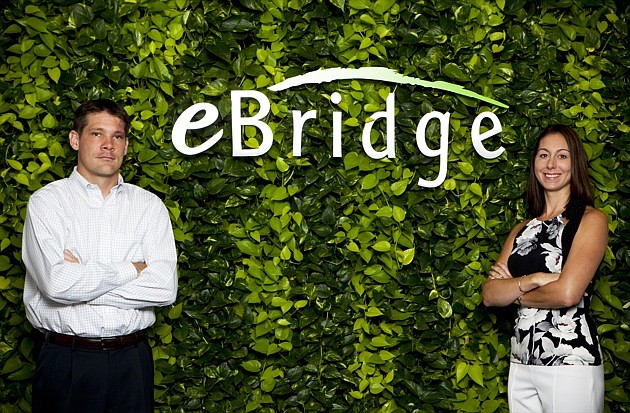Purchase your digital copy of the 2010 Gulf Coast 500!
Electronic conversion of sensitive documents, in particular medical records, is likely to become an increasing topic in years to come.
Tampa-based eBridge Solutions, which has been handling such tasks for most of the last decade, has expanded its capacity to take on the anticipated demand — including moving into a larger building.
Having started from an apartment closet just eight years ago, company principals Leslie Haywood and James Hanlon achieved 41% revenue growth last year, from $2.3 million in 2008 to nearly $3.3 million in 2009. The married partners, who have a 2-year-old boy, say they want to keep their company small and manageable, yet still be able to pursue any big business that comes their way.
“We don't want to go gangbusters and aren't trying to be everything to everybody,” says Haywood, CEO and vice president of eBridge. “We want to keep control of the throttle.”
Currently with a roster of 1,500 clients, eBridge serves as a data custodian to various industries, namely medical, financial, insurance and educational. Basically, it digitizes and stores confidential files and grants access only to those individuals designated by their clients.
Security is essential to this business. The servers at eBridge are secured in a giant glass room within an open work area, assuring that any one of the company's 20 employees is keeping an eye on it at all times. (Haywood and Hanlon are the only ones with access to the servers.)
Regular security audits are required for eBridge to maintain approvals from various industry groups and government agencies, such as the Securities and Exchange Commission. “It keeps you on your toes,” says Hanlon, the firm's president and chief information officer.
With pricing starting at $150 per month, many clients see real value in document digitization, namely the ability to free up office space taken up by multiple filing cabinets. But eBridge still has to compete with numerous firms specializing in storage of hard-copy materials.
“Unless they have identified a specific problem and ways to alleviate that problem, it's harder to convince” prospective clients that scanning is a better way to go, Haywood says. The company's sales staff must educate those clients of the cost savings involved in not having to hunt for specific files, the ability to access them anytime from anywhere, and the protection of documents from practically any situation, from burglaries to hurricanes.
Situated in the Westshore district near Interstate 275, eBridge relocated this summer to its own 13,000-square-foot building that it purchased for about $1 million with Small Business Administration financing. Up to $1.5 million was put into remodeling the former industrial warehouse, along with various furnishings.
The new headquarters replaces its former 5,000-square-foot offices at Urban Centre, plus a separate data center. “We were tripping over each other there,” Hanlon says, adding that employees had a lot of input into what went into the new offices.
Now eBridge employees have access to various perks they didn't get at the leased space, such as an onsite gym and daycare center, a recreation room with video games, and a full kitchen with microwave and conventional ovens. Small conference rooms are also available to workers when they want to collaborate or get out of their workstations.
Most importantly, the entire building is exposed to natural lighting, from newly installed windows to a giant skylight jutting above one of the building's original steel beams. Other “green” touches were added to enhance energy efficiency and clean air, including live plants. (That's real ivy growing behind the reception desk.)
Haywood points out that some of those measures are already paying for themselves. For example, the kitchen's new refrigerator has a filtered water dispenser, immediately eliminating the expense of bottled water delivery.
As for the future of digital document management, Haywood says a lot of questions remain regarding federal government rules addressing electronic medical records. The bottom line, though, is that “something has got to be done with all that paper,” she says.
Hanlon notes that any new regulations will not likely cause changes in the way eBridge scans and stores its documents, which are encrypted so that even if someone gained unauthorized access, it probably wouldn't do them any good. “We built our system from the ground up, the right way,” he says.






